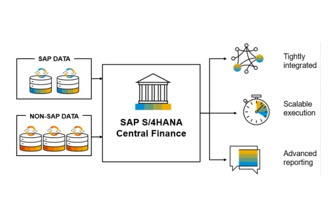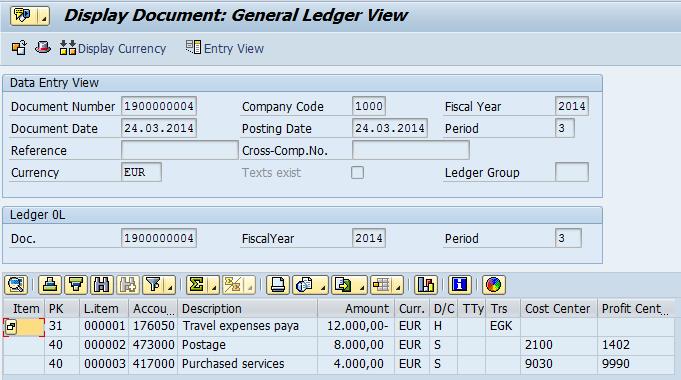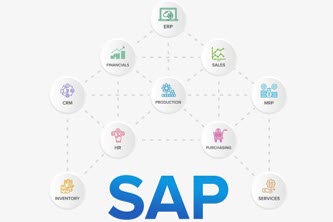Unlocking Success: The Strategic Imperative of Group Reporting in SAP Central Finance
by Michael Management
Why is Group Reporting Critical for SAP Central Finance?
 Mastering consolidated financial reports is more crucial than ever in today's complex financial landscape. Central Finance in SAP S/4HANA simplifies this intricate task with its robust Group Reporting feature. But why is this component vital? Dive deep into the heart of SAP Central Finance to explore how Group Reporting sharpens financial accuracy and enhances decision-making across corporate groups. This article uncovers the transformative impacts of Group Reporting, integrating data precision and financial transparency seamlessly—which is indispensable for thriving in dynamic market conditions. Let's dive in!
Mastering consolidated financial reports is more crucial than ever in today's complex financial landscape. Central Finance in SAP S/4HANA simplifies this intricate task with its robust Group Reporting feature. But why is this component vital? Dive deep into the heart of SAP Central Finance to explore how Group Reporting sharpens financial accuracy and enhances decision-making across corporate groups. This article uncovers the transformative impacts of Group Reporting, integrating data precision and financial transparency seamlessly—which is indispensable for thriving in dynamic market conditions. Let's dive in!
What is Group Reporting?
Group Reporting is an essential component of SAP's suite, offering a robust framework for group financial accounting and management reporting. Its functionality spans various critical processes, including data collection, quality control, consolidation, and reporting. Integrated seamlessly with SAP Financial Accounting, Group Reporting harnesses the power of the universal journal to access SAP financial accounting data directly. This integration allows for unparalleled visibility, enabling operational financial accounting data to be aggregated and analyzed at the corporate group level. Moreover, Group Reporting facilitates drill-down capabilities, empowering users to delve from high-level reports into granular operational financial accounting documents for deeper insights.
Why is Group Reporting SO important for Central Finance?
Within Central Finance, Group Reporting assumes a pivotal role beyond the traditional month-end close process. By leveraging pre-consolidated information, S/4HANA Finance for Group Reporting enables organizations to execute group closing steps directly within Central Finance. This approach yields fully consolidated financial statements, complete with essential intercompany eliminations. Consolidation activities can be seamlessly performed within the Central Finance environment or connected natively to the central system, ensuring efficiency and accuracy throughout the process.
The real-time consolidation capabilities embedded within Central Finance further enhance its appeal, offering organizations the flexibility to consolidate data directly from the Universal Journal or through periodic uploads from source ERP systems. This level of integration fosters a seamless transition between local and group closing activities, all within the SAP financial system. For organizations with significant data volumes stored in the Universal Journal, migrating to SAP S/4HANA Finance for Group Reporting presents a compelling value proposition, enabling them to leverage the full potential of their financial data.
Central Finance enables ETL data replication to bring non-SAP S/4HANA data into the universal journal, which supports global processes, including Group Reporting.
There is a tight integration between Central Finance and Group Reporting since Group Reporting utilizes most of the CfiIN master data (e.g. Profit Centers, Segments, CoA, Trading Partners, Exchange Rates) and Transactional data from the Universal Journal (ACDOCA). The CFIN system will serve as the data source for Group Reporting. Since all data is stored in ACDOCA and ACDOCU table stores all consolidation data, load of data from ACDOCA to ACDOCU is possible to execute continuously with Group Reporting. Data is real-time available in S/4HANA for Group Reporting.
To accommodate non-SAP systems, SAP S/4HANA Group Reporting Data Collection provides a streamlined mechanism for uploading data into the S/4HANA Group Reporting environment, ensuring seamless interoperability and data consistency.
SAP S/4HANA Group Reporting Process
Central Finance/Group Reporting Integration
There is a tight integration between Central Finance and Group Reporting since Group Reporting utilizes most of the CFIN master data (e.g. Profit Centers, Segments, CoA, Trading Partners, Exchange Rates, et al) and Transactional data from the Universal Journal (ACDOCA) i.e. The CFIN system will serve as the data source for Group Reporting.
Central Finance will bring the data from several systems to the central system in their source currencies. Then, Group Reporting will translate the reported financial data into the currency of the consolidation group. It is recommended that currency translation be run in Group Reporting.
The picture below describes an overview of the integration between CFIN (Central Finance), Group Reporting (Consolidation), SAP Analytics Cloud (Planning), and BW/4HANA (Reporting and Analytics).
Group Reporting Architectural Overview
Central Finance Scenarios
Central Finance offers various scenarios for SAP Group Reporting implementation, each designed to streamline financial consolidation and reporting processes.
Firstly, Central Reporting relies on the availability of data within Central Finance. It utilizes centralized data to streamline reporting processes, accessing consolidated data directly from Central Finance.
Central Processes encompass period-end closing activities conducted within the Central Finance System. Group Reporting seamlessly integrates into these processes, facilitating the efficient execution of closing activities such as group close, local close, intercompany eliminations, matching, reconciliation, and foreign currency translation.
Group Close functionality enables organizations to execute group closing steps within Central Finance. This ensures the consolidation of financial data across entities, guaranteeing accuracy and consistency in group-level financial statements.
Local Close incorporates local closing activities within the Central Finance environment. This allows for consolidating local financial data into the central reporting structure, aligning local and group reporting requirements.
Intercompany Eliminations automate the elimination of intercompany transactions and balances. This ensures that intercompany transactions do not impact consolidated financial statements, enhancing the accuracy and reliability of financial reporting.
Intercompany Matching and Reconciliation facilitate the matching and reconciliation of intercompany transactions. This process identifies and resolves discrepancies between intercompany transactions across entities, ensuring data consistency and integrity.
Foreign Currency Translation supports the translation of financial data into the currency of the consolidation group. This enables organizations to report financial results in a consistent currency format, enhancing comparability and understandability of financial statements across geographies.
Conclusion
Group Reporting within SAP offers organizations a comprehensive solution for group accounting and management reporting. Its tight integration with SAP S/4HANA Finance streamlines critical processes such as data collection, consolidation, and reporting, empowering users with real-time insights and actionable intelligence. Central Finance further enhances the functionality of Group Reporting by providing a centralized platform for executing group closing steps and consolidating financial data. The seamless integration between Central Finance and Group Reporting ensures data consistency and accuracy while facilitating interoperability with non-SAP systems. As organizations navigate the complexities of modern finance, Group Reporting emerges as a vital tool, enabling them to drive efficiency, transparency, and compliance in their financial consolidation and reporting endeavors.
If you're ready to learn more about Central Finance and Group Reporting, you can Discover a Better Way to Learn SAP Now with Michael Management.
by Michael Management
More Blogs by Michael Management

SAP for Finance Teams: How CFOs Can Leverage SAP...
As SAP evolves in 2025 with S/4HANA’s cloud capabilities and...

How B2B Companies Can Future-Proof Their Workforce...
We are in an era when digital transformation is redefining every s...

SAP Training Best Practices for Large Enterprises...
Coordinating SAP training in a large enterprise is like leading a ...
Related Blogs

Kickstart Your Career: Mastering SAP Inventory...
SAP inventory management is an in-demand skill set from large companie...

Unlock Financial Precision: The Critical Role of...
Mastering Document Splitting in SAP Central Finance: Essential Insights for...
.png)


